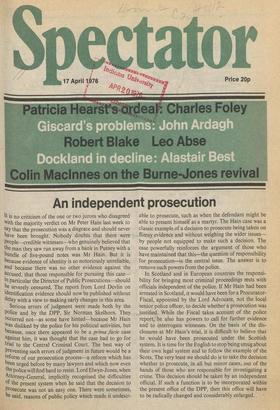An independent prosecution
It is no criticism of the one or two jurors who disagreed With the majority verdict on Mr Peter Hain last week to say that the prosecution was a disgrace and should never have been brought. Nobody doubts that there were People—credible witnesses—who genuinely believed that the man they saw run away from a bank in Putney with a bundle of five-pound notes was Mr Hain. But it is because evidence of identity is so notoriously unreliable, and because there was no other evidence against the accused, that those responsible for pursuing this casein particular the Director of Public Prosecutions—should be severely censured. The report from Lord Devlin on identification evidence should now be published without delay with a view to making early changes in this area.
Serious errors of judgment were made both by the Police and by the DPP, Sir Norman Skelhorn. They occurred not—as some have hinted—because Mr Hain Was disliked by the police for his political activities, but because, once there appeared to be a prima facie case against him, it was thought that the case had to go for trial to the Central Criminal Court. The best way of Preventing such errors of judgment in future would be a reform of our prosecution process—a reform which has been urged before by many lawyers and which now even the police will find hard to resist. Lord Elwyn-Jones, when Attorney-General, implicitly recognised the difficulties or the present system when he said that the decision to Prosecute was not an easy one. There were sometimes, he said, reasons of public policy which made it undesir able to prosecute, such as when the defendant might be able to present himself as a martyr. The Hain case was a classic example of a decision to prosecute being taken on flimsy evidence and without weighing the wider issues— by people not equipped to make such a decision. The case powerfully reinforces the argument of those who have maintained that this—the question of responsibility for prosecution—is the central issue. The answer is to remove such powers from the police.
In Scotland and in European countries the responsibility for bringing most criminal proceedings rests with officials independent of the police. If Mr HaM had been arrested in Scotland, it would have been for a ProcuratorFiscal, appointed by the Lord Advocate, not the local senior police officer, to decide whether a prosecution was justified. While the Fiscal takes account of the police report, he also has powers to call for further evidence and to interrogate witnesses. On the basis of the disclosures at Mr Hain's trial, it is difficult to believe that he would have been prosecuted under the Scottish system. It is time for the English to stop being smug about their own legal system and to follow the example of the Scots. The very least we should do is to take the decision whether to prosecute, in all but minor cases, out of the hands of those who are responsible for investigating a crime. This decision should be taken by an independent official. If such a function is to be incorporated within the present office of the DPP, then this office will have to be radically changed and considerably enlarged.


































